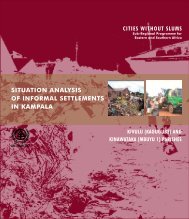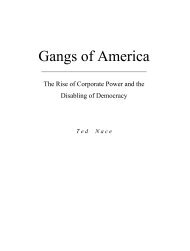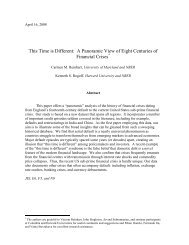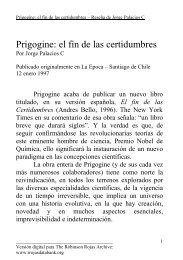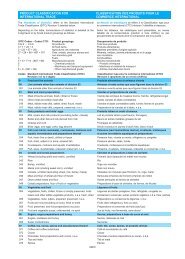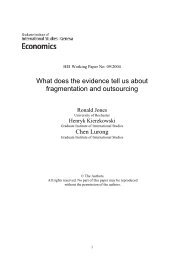You also want an ePaper? Increase the reach of your titles
YUMPU automatically turns print PDFs into web optimized ePapers that Google loves.
From the ports, the <strong>be</strong>ans are shipped to cocoa processors. America's biggest are ADM Cocoa in<br />
Milwaukee, a subsidiary of Decatur, Ill.-based Archer Daniels Midland; Barry Callebaut, which has its<br />
headquarters in Zurich, Switzerland; Minneapolis-based Cargill; and Nestle USA of Glendale, Calif., a<br />
subsidiary of the Swiss food giant.<br />
But by the time the <strong>be</strong>ans reach the processors, those picked by slaves and those harvested by free field<br />
hands have <strong>be</strong>en jumbled together in warehouses, ships, trucks and rail cars. By the time they reach<br />
consumers in America or Europe, free <strong>be</strong>ans and slave <strong>be</strong>ans are so thoroughly blended that there is no<br />
way to know which <strong>chocolate</strong> products taste of slavery and which do not.<br />
<strong>How</strong>ever, even the Chocolate Manufacturers Association, a trade group for American <strong>chocolate</strong> makers,<br />
acknowledges that slaves are harvesting cocoa on some Ivory Coast farms.<br />
A 1998 report from UNICEF, the United Nations Children's Fund, concluded that some Ivory Coast<br />
farmers use enslaved children, many of them from the poorer neighboring countries of Mali, Burkina<br />
Faso, Benin and Togo. A report by the Geneva, Switzerland-based International Labor Organization,<br />
released June 15, found that trafficking in children is widespread in West Africa.<br />
The State Department's year 2000 human rights report concluded that some 15,000 children <strong>be</strong>tween the<br />
ages of 9 and 12 have <strong>be</strong>en sold into forced labor on cotton, coffee and cocoa plantations in northern<br />
Ivory Coast in recent years.<br />
Aly Diabate and 18 other boys labored on a 494-acre farm, very large by Ivory Coast standards, in the<br />
southwestern part of the country. Their days <strong>be</strong>gan when the sun rose, which at this time of year in Ivory<br />
Coast is a few minutes after 6 a.m. They finished work about 6:30 in the evening, just <strong>be</strong>fore nightfall,<br />
when fireflies were <strong>be</strong>ginning to illuminate the velvety night like Christmas lights. They trudged home to<br />
a dinner of burned bananas. If they were lucky, they were treated to yams seasoned with saltwater<br />
"gravy."<br />
After dinner, the boys were ordered into a 24-by-20- foot room, where they slept on wooden planks<br />
without mattresses. The only window was covered with hardened mud except for a baseball-size hole to<br />
let some air in.<br />
"Once we entered the room, nobody was allowed to go out," said Mamadou Traore, a thin, frail youth<br />
with serious brown eyes who is 19 now. "Le Gros gave us cans to urinate. He locked the door and kept the<br />
key."<br />
"We didn't cry, we didn't scream," said Aly (pronounced AL-ee). "We thought we had <strong>be</strong>en sold, but we<br />
weren't sure."<br />
The boys <strong>be</strong>came sure one day when Le Gros walked up to Mamadou and ordered him to work harder. "I<br />
bought each of you for 25,000 francs (about $35)," the farmer said, according to Mamadou (MAH-mahdoo).<br />
"So you have to work harder to reimburse me."<br />
Aly was barely 4 feet tall when he was sold into slavery, and he had a hard time carrying the heavy bags<br />
of cocoa <strong>be</strong>ans.<br />
"Some of the bags were taller than me," he said. "It took two people to put the bag on my head. And when<br />
you didn't hurry, you were <strong>be</strong>aten."<br />
2






